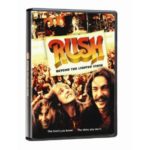
Banger Productions
Rush has been around for so long and with so little fanfare from the mainstream press or serious music lovers that one is taken aback when bassist/keyboardist/vocalist Geddy Lee cracks, “We’re the World’s Most Popular Cult Band.” And, you know, as a diehard fan for numerous years of America’s Most Popular Live Cult Band, Phish, one is especially humbled and startled since Lee isn’t too far off the mark. Fuck me—he’s dead right.
Rush has created an impressive catalogue of music, which was originally rooted in Zeppelinesque metal conquests and Yes progressive detours, eventually finding their artistic footing on their landmark 1981 album, Moving Pictures, which cemented the band’s unique sound and reputation as a power trio that rocked with their geeky hearts clearly on their sleeves. If the song is the thing, and rhythm is king, then Rush had all of that in spades on Pictures. Clearly, this was an album that almost appears like a greatest hit collection, rather than a mid-career signpost leading the way to the future.
Rush is also a threesome of very different personalities. Indeed, Lee, with childhood friend, Alex Lifeson on guitars, and resident Grand Master of Intellectual Geekdom, Neil Peart on drums and lyrics, help form a band that clearly has no equals in their genre of one. Combining metal, prog, pop hooks, hard rock, and Ayn Rand philosophical lyrical content rooted in self-determination, the trio has defied the critical odds for nearly four decades. Oh, and Peart happens to be one of the best drummers in rock history.
In Beyond the Lighted Stage, veteran music film documentarians Sam Dunn and Scot McFadyen have created a fascinating study of the Canadian band with modern interviews that are witty, humble, and surprisingly penetrating (Lee’s parents were Holocaust survivors, and his tale is sobering; whereas Lifeson’s parents were émigrés from an impoverished Yugoslavia; Peart, Jesus…he was such an intellectual at a young age that he took up knitting just to see how it was done). The directorial doc duo also mix in a plethora of archival videos, live footage, family films, peer and second- and third-generation musical descendent interviews praising the boys from up north. All of this celluloid bounty is a damned treasure trove for old and new fans alike.
Best of all? The trio themselves is highly entertaining and shamelessly mocks each other on every occasion. As Les Claypool, for once, with his tongue not planted firmly in his cheek, comments at one point, the band still gets along as friends and continues to write, record, and play great music, and how many trios (Primus comes to mind as does the seemingly-defunct Oysterhead), quartets, or whathaveya does that nowadays? Rush has been around a long time because they created sophisticated music for the people which wasn’t pompous. Self-indulgent in the early “let’s out-Tull Jethro Tull” era? Yeah, perhaps. However, they also withstood the negative winds of critical forces beyond their control, crafted memorable songs, eventually locked into their collective inner teenager, and never quite let go. And guess what? More power to ‘em—trio, or otherwise.



No Comments comments associated with this post